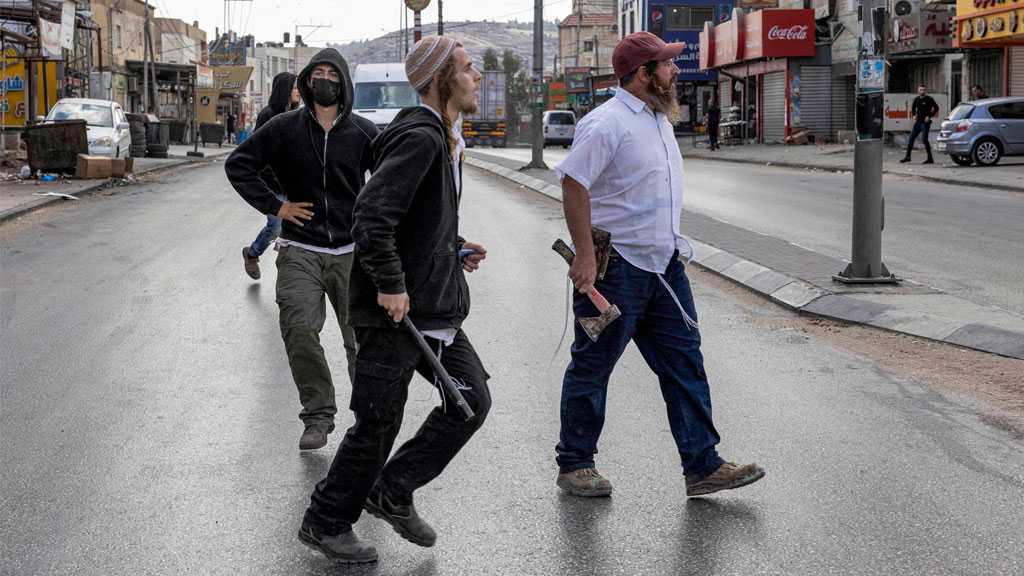October War Probe Links Sinai 1973 to Lebanon 2006

Source: Al-Manar TV, 8-10-2008
"Israeli" daily Haaretz published Wednesday an analysis on the failures of war and compared the "Israeli" failure in 1973 during the Yom Kippur war to its failure during the Second Lebanon War in 2006.
The 35 years that have passed since the outbreak of the Yom Kippur War have done nothing to reduce the spate of publications about it. This year, the "Israeli" war establishment contributed its bit with Tuesday's release (shockingly belated) of the testimony given by several senior officials to the Agranat Commission, which investigated the war.
Some of this testimony provides new angles on, or fills in details about, old but still burning questions: Why was equipment not brought closer to the front? Why were the fortifications on the Suez Canal abandoned? And who was right - chief of staff David Elazar or war minister Moshe Dayan? Armored division commander Ariel Sharon or GOC Southern Command Shmuel ("Gorodish") Gonen?
These questions are not academic. An entire generation of "Israelis" formed its opinions on issues of peace and security based on the trauma of that war. It is no coincidence that "Israeli" War Minister Ehud Barak chose Tuesday to tour the occupied Golan Heights and warn that "in the north, one can never know when things will change."
It is possible to point out some of the similarities between this testimony and a smaller, fresher trauma - the Second Lebanon War.
* Some of the complaints from 1973 sound familiar: irrelevant battle plans, contradictory orders, criticisms of senior officers who stayed in the rear. But one major difference is that Yom Kippur began with a surprise attack by Egypt and Syria. In the Second Lebanon War, in contrast, "Israel" surprised itself, when the cabinet approved going to war on July 12 without realizing that this was what its vote meant.
Another similarity, albeit on a smaller scale, was "Israel's" contempt for the enemy. In 1973, we assumed the Egyptians would not be able to cross the Suez Canal. In 2006, we thought we would send Lebanon "20 years back in time" (to quote then chief of staff Dan Halutz). In both cases, the enemy turned out to be more determined and more sophisticated than "Israel" had imagined.
* In both wars, the cease-fire was the signal for a new "war" to break out - on the home front. After the Yom Kippur War, Dayan openly tried to shift the blame to Elazar. Following the last war, the same attempt was made, but with a bit more finesse: Officially, the politicians were careful to give the military their full backing. But at critical moments (from Prime Minister Ehud Olmert's visit to the north a week before the fighting ended through his interview last week with Yedioth Ahronoth), fingers were pointed in all directions.
* In both wars, generals at the front, far from the General Staff, had trouble controlling their officers. Sharon and Gorodish in 1973 complained of the same thing that GOC Northern Command Udi Adam did in the last war. It seems that the post of general of command in a failing war is an almost sure-fire way to end a military career.
Adam's testimony to the Winograd Committee, which investigated the Second Lebanon War, has not yet been released. Indeed, a year after this panel promised the High Court of Justice to publish all the testimony promptly, less than half of it has come out. One wonders whether this, too, will take 35 years.
Coincidently, "Israeli" daily Maariv Tuesday published the transcript of a conversation between Halutz and then war minister Amir Peretz, in which Halutz expressed shock at the fact that his generals were criticizing him. Halutz, who served as a reserve pilot during the Yom Kippur War, did not remember the lesson of history: When survival is at stake, almost everyone talks. Halutz also lacked good intelligence. Four generals, he told Peretz, were "chronic slanderers." Only four?
* Trauma, then and now: Sharon's testimony, in which he described the trauma of the Yom Kippur War by harking back to his experiences as a platoon commander in the War of Independence, was unexpectedly touching. "Our forces suffered an incomparable shock [in 1973]," he said. "The "Israeli" Army was an army that wins. No one in this generation had ever felt the taste of defeat the way we felt it, for example, in 1948."
"Israeli" daily Haaretz published Wednesday an analysis on the failures of war and compared the "Israeli" failure in 1973 during the Yom Kippur war to its failure during the Second Lebanon War in 2006.
The 35 years that have passed since the outbreak of the Yom Kippur War have done nothing to reduce the spate of publications about it. This year, the "Israeli" war establishment contributed its bit with Tuesday's release (shockingly belated) of the testimony given by several senior officials to the Agranat Commission, which investigated the war.
Some of this testimony provides new angles on, or fills in details about, old but still burning questions: Why was equipment not brought closer to the front? Why were the fortifications on the Suez Canal abandoned? And who was right - chief of staff David Elazar or war minister Moshe Dayan? Armored division commander Ariel Sharon or GOC Southern Command Shmuel ("Gorodish") Gonen?
These questions are not academic. An entire generation of "Israelis" formed its opinions on issues of peace and security based on the trauma of that war. It is no coincidence that "Israeli" War Minister Ehud Barak chose Tuesday to tour the occupied Golan Heights and warn that "in the north, one can never know when things will change."
It is possible to point out some of the similarities between this testimony and a smaller, fresher trauma - the Second Lebanon War.
* Some of the complaints from 1973 sound familiar: irrelevant battle plans, contradictory orders, criticisms of senior officers who stayed in the rear. But one major difference is that Yom Kippur began with a surprise attack by Egypt and Syria. In the Second Lebanon War, in contrast, "Israel" surprised itself, when the cabinet approved going to war on July 12 without realizing that this was what its vote meant.
Another similarity, albeit on a smaller scale, was "Israel's" contempt for the enemy. In 1973, we assumed the Egyptians would not be able to cross the Suez Canal. In 2006, we thought we would send Lebanon "20 years back in time" (to quote then chief of staff Dan Halutz). In both cases, the enemy turned out to be more determined and more sophisticated than "Israel" had imagined.
* In both wars, the cease-fire was the signal for a new "war" to break out - on the home front. After the Yom Kippur War, Dayan openly tried to shift the blame to Elazar. Following the last war, the same attempt was made, but with a bit more finesse: Officially, the politicians were careful to give the military their full backing. But at critical moments (from Prime Minister Ehud Olmert's visit to the north a week before the fighting ended through his interview last week with Yedioth Ahronoth), fingers were pointed in all directions.
* In both wars, generals at the front, far from the General Staff, had trouble controlling their officers. Sharon and Gorodish in 1973 complained of the same thing that GOC Northern Command Udi Adam did in the last war. It seems that the post of general of command in a failing war is an almost sure-fire way to end a military career.
Adam's testimony to the Winograd Committee, which investigated the Second Lebanon War, has not yet been released. Indeed, a year after this panel promised the High Court of Justice to publish all the testimony promptly, less than half of it has come out. One wonders whether this, too, will take 35 years.
Coincidently, "Israeli" daily Maariv Tuesday published the transcript of a conversation between Halutz and then war minister Amir Peretz, in which Halutz expressed shock at the fact that his generals were criticizing him. Halutz, who served as a reserve pilot during the Yom Kippur War, did not remember the lesson of history: When survival is at stake, almost everyone talks. Halutz also lacked good intelligence. Four generals, he told Peretz, were "chronic slanderers." Only four?
* Trauma, then and now: Sharon's testimony, in which he described the trauma of the Yom Kippur War by harking back to his experiences as a platoon commander in the War of Independence, was unexpectedly touching. "Our forces suffered an incomparable shock [in 1973]," he said. "The "Israeli" Army was an army that wins. No one in this generation had ever felt the taste of defeat the way we felt it, for example, in 1948."




